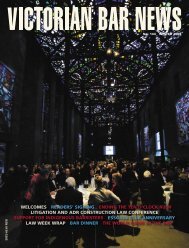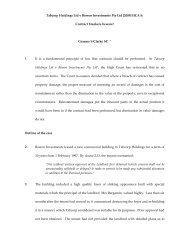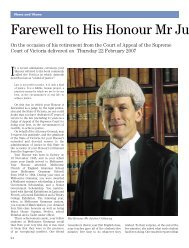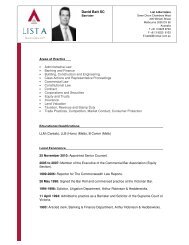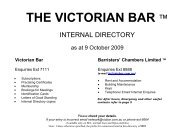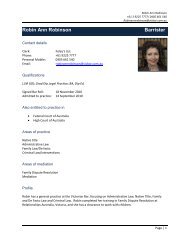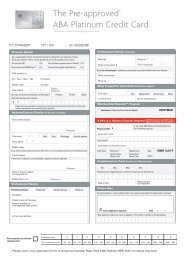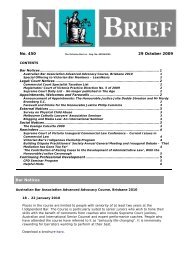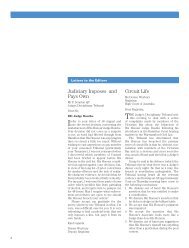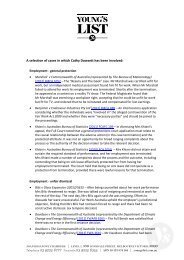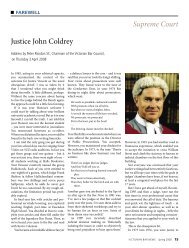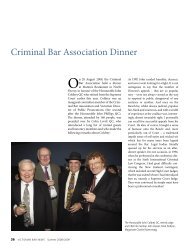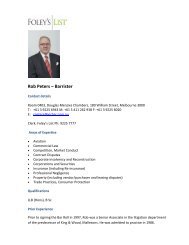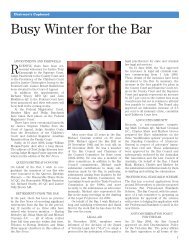Justice William Charles Crockett AO - Victorian Bar
Justice William Charles Crockett AO - Victorian Bar
Justice William Charles Crockett AO - Victorian Bar
- No tags were found...
You also want an ePaper? Increase the reach of your titles
YUMPU automatically turns print PDFs into web optimized ePapers that Google loves.
e Callawayfundamental to our freedom. What happenswhen this principle is departed fromis evident from what is going on in manylands today. We must see to it that our citizensall understand that an independentjudiciary is the greatest bulwark of theirliberties and their best defence againsttotalitarian rule ...Everyone asks me what Iam going to do ... I shallreturn to my first loves:history and philosophyand those aspects ofhuman experience that,even now, are bestexpressed in religiouslanguage.Nor have I regretted the quantity ofour criminal work. What is more important,I ask rhetorically, than the protectionof the community and the liberty ofthe subject?The other main reason that I havedecided to retire is the decision of theHigh Court in Weiss v R. (2005) 80 ALJR444, 223 ALR 662. Much might be saidagainst that decision without disrespectto the High Court. I confine myself to onepoint. Their Honours’ construction ofthe proviso amounts to this: a trial miscarriesthrough no fault of the accused,his grounds are meritorious and theyare upheld by the Court of Appeal; buthe is denied a retrial because three, orperhaps only two, judges of appeal aresatisfied that he is guilty. As a very experiencedcriminal judge said to me lastyear, it amounts to saying to an appellant,“You have not had a proper trial andyou are not going to.”Sir Edmund Herring referred, amongother things, to the importance of anindependent judiciary. Trial by jury isof no less importance, not only as ameans of involving the community inthe criminal justice system but as aprotection of our liberties. The proviso,as previously understood for a longtime, applied only if the error at thetrial made no difference or conviction,by a jury, was inevitable. I find it hardto believe that the British Parliament,when it enacted the Criminal AppealAct 1907, or the <strong>Victorian</strong> Parliament,when it enacted the Criminal AppealAct 1914, intended such a departurefrom our legal norms as Weiss v R.decides.When the House of Lords decidedDirector of Public Prosecutions v Smith[1961] AC 290, Sir Owen Dixon said thatit contained propositions that he couldnever bring himself to accept. For thatreason, in Parker v R. (1963) 111 CLR610 at 632, the High Court declared itsindependence from the House of Lords.Weiss v R. contains propositions that Icould never bring myself to accept, butI cannot declare my independence fromthe High Court.Everyone asks me what I am goingto do. At least initially, in the words ofsomeone I met when I was on holidaylast year, I intend to do retirement andI intend to do it very well. Again like SirOwen Dixon, I shall not be reading thelaw reports. I shall return to my firstloves: history and philosophy and thoseaspects of human experience that, evennow, are best expressed in religious language.I end as I began, by thanking youall for your support over these last 12years and for your attendance this afternoon. 29



